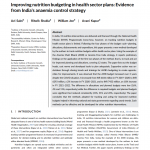
CWG 2010 here we come…but at what cost?
3 June 2010
Delhi is a city under siege! Over the last year, a silent army of civil engineers, urban planners, construction workers and contractorss have brought this to a standstill. Signs of the siege are everywhere – on uneven sidewalks and pavements which threaten to send pedestrians sprawling, on roads and flyovers where monstrous potholes threaten to swallow unsuspecting motorists and bring the city to a grinding halt. The mission? Make Delhi ready and able to host the Commonwealth Games (CWG) in October this year.
The games have been heavily criticised and not only because preparations for them have thrown everyday life in the city completely off kilter. Concerns have been raised about the ‘game worthiness’ of several venues, the hurried efforts to ‘beautify’ certain sections of the city, the efforts to ‘clear’ the city of slum dwellers, beggars and hawkers which in practice has meant the demolition slums across the city leaving thousands homeless. A recent report by the Housing and Land Rights Network (HLRN) titled “The 2010 Commonwealth Games: Whose Wealth? Whose Commons?” puts a spotlight on some of these issues. Using the Right to Information Act 2005, HLRN accessed a copy of India’s Bid Document for the CWG games as well as information from different departments on the monies spent so far on the games. Their findings are staggering:
CWG Factoids
- The bidding process from start to finish cost India Rs 137 crore. The Bid Document included an unprecedented offer by India to provide free luxury accommodation, travel and trips to participants, delegates, officials.
- India made a last minute offer of $7.2 million or Rs 32.4 crore to train all Commonwealth Games athletes’ which apparently ensured India’s bid for the games.
- The proposed expenditure on sports infrastructure for the games was pegged at Rs 150 crore in the Bid Document but a whopping sum of Rs 3390 crore has already been spent on building stadiums. That’s a shocking 2160% increase on the initial budget!
- Official and unofficial estimates of the total cost of the games range from Rs 10,000 crore to Rs 30,000 crore;
The sheer volume of money being pumped into the CWG is unprecedented. To put things in perspective in this year’s Union Budget allocations for the CWG increased by a jaw dropping 6235% (from Rs 45.5 crore in 2005-06 to Rs 2,883 crore in 2009-10) (HLRN figures). Is this a case of misplaced priorities or are there really substantial gains to be had from hosting the games? In theory, the CWG games are supposed to put Delhi on the world map, bring in foreign investment, tourism and generate jobs, but international experience suggests that this is not always the case.
Several studies have shown that the economic benefits of mega-sporting events such as the Olympic Games or World Cup are hugely over-estimated. In a post-games scenario, many countries have struggled to earn back in revenues the huge amounts invested. For instance, American cities hosting the 1994 FIFA World Cup earned $ 4 billion in revenues from hosting the games but they collectively lost between $ 5.5 billion and $ 9.3 billion. Many countries are overwhelmed by debt – after barely pulling off the Olympic Games in 2004, Greece struggled to keep public debt down, the effects of which are being felt now. The costs continue to escalate for years after with countries having to find resources to manage and maintain games venues.
There are also questions about who really benefits from such events? South Africa has spent 3.5 billion pounds on preparations (1.72% of its GDP) to host the 2010 FIFA World Cup, but there are concerns that most of the facilities will really benefit tourists and the middle class rather than South Africa’s urban poor. Over and above the, investments in infrastructure mean budget cuts for other sectors. The Delhi Government has already announced that it will not have funds to undertake new projects in the forthcoming fiscal year. Moreover, according to the HLRN report funds marked for social sector expenditure have already been reallocated by the Delhi Government for the CWG. Couple this with the city wide drive against hawkers and beggars and it’s no wonder many have termed the CWG ‘anti-poor’ in its approach.
It is perhaps keeping of all of these factors in mind, that the Government of New Zealand recently refused to support the country’s bid to host the 2018 Commonwealth Games because at $600 million it was too expensive. If only, such prudence had prevailed in Delhi. Come October, Delhi will play host to athletes’ and tourists from countries across the Commonwealth. In true sarkari style, things will be completed in breakneck speed, we’ll put on a grand old show and maybe we’ll even win a medal or two. But let’s not kid ourselves; we’re in for some tough times ahead – fiscal and otherwise.
Mandakini D Surie is a Research Associate with the Accountability Initiative.





